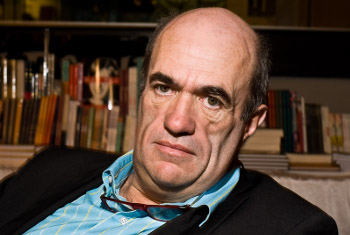George Orwell arrived in Barcelona on Boxing Day 1936. He was 33 years old. He came here to fight as a volunteer on the side of the Republic as an anti-fascist militant. He found a revolutionised and revolutionary city where, in his words, “the working class was in the saddle”. He served on the Aragon front with the POUM militias and was shot through the neck by a fascist bullet. In Barcelona, he was a direct witness of the fateful days when a civil war took place within a civil war. Stalinist pressure on the Republic led to the May Days and the city became the setting for a bloody battle between forces that, up to that point, had fought side by side against the common enemy. Orwell witnessed that new Tragic Week where the authoritarian urges of some and the libertarian urges of others opened up an incurable rift in the strategy to win the war and uphold the revolutionary spirit. With the POUM outrageously declared illegal and its leader Andreu Nin tortured and murdered by Soviet agents, Orwell had to escape the persecution against his comrades-in-arms and depart in hiding from a city where he had discovered – and maintained, in spite of everything – a revolutionary and fraternal spirit that forever marked his political stance and the direction of a literary journey that culminated with Nineteen Eighty-Four.
Colm Tóibín arrived in Barcelona in 1975. He was 20 years old. He came to a city that still had the literary echoes of Homage to Catalonia in its head. He found a city that was awaiting the imminent death of the dictator, a society that was effervescent, creative and mobilised, but still under constant surveillance and repressed by a regime that was especially cruel, and aware that it was in its dying moments. In the midst of a dictatorship, the young Tóibín, paradoxically, found an atmosphere of change and an explosion of the much longed-for liberties. The Barcelona of the end of the Franco era and the start of the transition – so radically different to the Catholic and rural society of Ireland – became an initiatic space for Tóibín: a mixture of collective hope for the future and individual liberties that the young Irishman embraced as his own. In Barcelona, Tóibín learned to be who he is and adopted Catalonia as his second homeland. His successful literary career is full of traces of that decisive formative experience.
Now, on the occasion of Orwell Day, Tóibín offers us a re-reading of Homage to Catalonia in an attempt to put into perspective the Barcelona of 1936, – that of a frustrated revolution and a lost war – and that of 1975 – which was beginning the change from a dictatorship to a capitalist democracy. In this transition, the city will play an essential role and will be one of the keys of the configuration of the literary universe of Orwell and of Tóibín himself.








